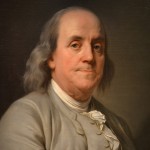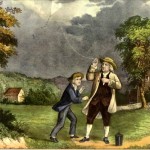 I don’t know of any family relationship that exists in my family or in Bob’s family, but I have always had an interest in Benjamin Franklin anyway. I have done a lot of hiking in my life, and sometimes, like it or not, bad weather comes in before we were done with our hike. I think anyone who has hiked much knows that one of your worst enemies on a hike…other than mountain lions, bears, or snakes…is lightning. Personally, when I start to hear thunder, I figure it’s time to head for shelter, but when you are four or five miles from your car, in the middle of a bunch of trees, heading for shelter isn’t always an easy task.
I don’t know of any family relationship that exists in my family or in Bob’s family, but I have always had an interest in Benjamin Franklin anyway. I have done a lot of hiking in my life, and sometimes, like it or not, bad weather comes in before we were done with our hike. I think anyone who has hiked much knows that one of your worst enemies on a hike…other than mountain lions, bears, or snakes…is lightning. Personally, when I start to hear thunder, I figure it’s time to head for shelter, but when you are four or five miles from your car, in the middle of a bunch of trees, heading for shelter isn’t always an easy task.
Ben Franklin, on the other hand saw lightning as a challenge to be explored. I think he had to have known the dangers of such an adventure, because he was a scientist after all. That didn’t really matter to him much, or if it did, he did not show it. Ben Franklin became interested in electricity in the mid-1740s. Not much was known about the subject, but he would spend the next decade conducting experiments using electricity. It was Ben who coined terms still in use today. You now them…battery, conductor, and electrician. He also invented the lightning rod, which is now used to protect buildings and ships. All of these things came from his many experiments. Ben Franklin was an amazing man, publisher, and writer, but it is really not in his writings that I find myself intrigued, but rather his electrical experiments. On this day, June 10, 1752, Ben flew his now infamous kite during a thunderstorm to collect a charge in a Leyden jar, when the kite was struck by lightning. He wanted to demonstrate the electrical nature of lightning.
Benjamin Franklin was born January 17, 1706. People might think that Benjamin Franklin was a highly educated man, but in reality, his formal education ended at age ten. Then he went to work for his brother, James as a printer, but after a dispute in 1723, he left Boston and moved to Philadelphia and found work as a printer. He moved to London for a short time and worked there as a printer, and then returned to Philadelphia. He became a successful businessman whose publishing ventures included the Pennsylvania Gazette and Poor Richard’s Almanack, a collection of homespun proverbs advocating hard work and honesty in order to get  ahead. Eventually, Benjamin Franklin became an overachiever…or at least in the eyes of many people. I think he was just interested in a lot of things.
ahead. Eventually, Benjamin Franklin became an overachiever…or at least in the eyes of many people. I think he was just interested in a lot of things.
Of course, we all know about Benjamin Franklin’s career as a statesman, which spanned for decades, his years as a legislator, and his diplomatic years in England and France. He is the only politician to have signed all four documents fundamental to the creation of the US: the Declaration of Independence (1776), the Treaty of Alliance with France (1778), the Treaty of Paris (1783), which established peace with Great Britain, and the U.S. Constitution (1787). Yes, he was an all around amazing man, but I will always love the idea of his lightning experiments the best.


Leave a Reply